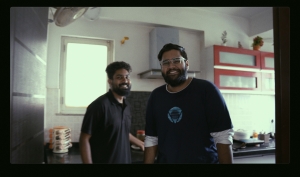

Bengaluru jazz-rap outfit Fakeer And The Arc released one of the most interesting and lucid realizations of the genre back in 2020 (the year the pandemic happened, in case we’ve all decided to forget), a wonderful EP called ‘Ikigai’ (that we loved). This was a lovely little 11-minute listening experience with three short songs and an undeniably cool vibe. This release was part of what turned what was once the rock capital of South India (besides the ego death of the genre) into a place that now has its finger on the pulse of what will become wildly popular a couple years from now. Fakeer And The Arc have now released ‘Fly’, their first real piece of public-consumption music since, and it is as relevant as ever.
Yes, of course you will gravitate towards the tight-but-relaxed grooves on the tune, courtesy Sange Wangchuk, who also plays for a band called Till Apes (that’s a joke; you know them, obviously). The instrumentation that surrounds it (courtesy some incredibly tasteful work from Aniket Roy Chowdhury on guitar and Raghuraman Subramanian on le bass) is equally exciting, but it’s Fakeer’s subject matter that commands the most attention. Oran Brahma (who’s Fakeer) talks about the idea of getting away from the constant and almost desperate desire for fame and virality that plagues so much of the world’s popular culture today. It’s a weirdly contrarian opinion on the state of entertainment, and it validates everything this piece of music is about. It’s catchy, but not for the sake of it. It’s not built for content even though you can put any 8 bars of it into a Reel. It’s not even particularly energetic despite the very garage/2-step vibe of its second half. It’s almost like the musicians involved are dipping into a sound only because it serves their creative interests, which is such a breath of fresh air.
‘Fly’ is essentially a song that makes you reflect in spite of itself, which is far rarer than one would think. More importantly, it’s made with honesty and a dedication to a vibe; far rarer than one would think. Don’t believe that? Listen to its outro. And then, play it again. And maybe another time after that.
You all have heard ‘Walk Away’ before in so many contexts. Not this one, though.
Yesterday’s sounds and today’s writing come together to form a pleasant whole
There is not even a hint of anything other than a classic melody-driven Hindi ballad here



-min.jpg)


Leave a comment